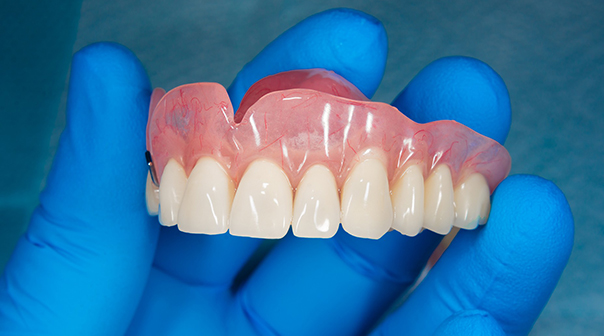
What are dentures?
Types of Dentures
Full Dentures
Full dentures, also referred to as complete dentures, present a viable option for replacing either the upper, lower, or both sets of teeth. It's essential to understand that dental treatments are personalized and not universally applicable. The creation, construction, and fitting of full dentures are customized to fulfill the distinct needs of each individual patient.Conventional Full Denture
After the extraction of all remaining teeth and ample healing of the surrounding tissues, a custom denture is meticulously crafted and subsequently placed. The construction of a full denture post complete healing guarantees a precise and comfortable fit.Immediate Denture
An immediate denture promptly replaces teeth right after extraction, eliminating the wait for full healing. While this prevents the discomfort of being without teeth, adjustments and a reline may be necessary as the tissues heal. In specific cases, choosing a conventional denture might be essential to ensure the highest level of comfort and an optimal fit.Overdenture
An overdenture is a full denture that obtains enhanced stability and support by utilizing special attachments. These attachments are either connected to the existing natural teeth or to specific dental implants.Implant-Supported Dentures
Known as an implant-supported denture, this type of denture connects to a specific number of strategically positioned implants in the upper or lower jaw. These implants act as small surgical posts, offering exact attachment points for the denture and notably enhancing stability and retention.Partial Dentures
In situations where some strong natural teeth remain, partial dentures offer an effective solution for replacing missing teeth. These partial dentures typically achieve secure retention and stability through clasps or precision attachments on adjacent teeth, bridging the gaps left by the missing teeth.
Removable partial dentures are specifically designed to fill the spaces created by individual or multiple missing teeth, restoring both the aesthetics and functionality of a complete smile. By addressing these gaps, partial dentures stabilize the dentition and bite, preventing the unwanted movement of remaining natural teeth.
Much like full dentures, the design and creation of partial dentures are tailored to each patient’s unique needs. With advancements in dental materials and technology, wearers of partial dentures now have various options. Presently, a partial denture's supportive framework can be made from a range of materials, including cast metal, flexible resins, and hybrid materials.
At Lakeview Family Dentistry, we are dedicated to fostering healthy and beautiful smiles. As your trusted partner in dental care, you can rely on our office to craft and produce a denture that not only looks aesthetically pleasing but also fits comfortably and serves you well for years to come.
What To Expect When You Receive Your New Denture
Adjusting to wearing a new denture
Adjusting to a new denture, especially a full denture, might entail a short adaptation period. It's typical to encounter minor difficulties when speaking, chewing, and getting accustomed to your new teeth. Attaining a perfect and comfortable fit may require some fine-tuning. If you detect any sore spots, we suggest wearing the denture for at least a day before your scheduled adjustment appointment. This allows us to accurately pinpoint the areas causing irritation and make the required adjustments accordingly.More saliva than usual
The heightened saliva production triggered by new dentures is a natural and temporary response. There's no need for alarm, as this increased salivary flow will gradually normalize over time.Speaking with ease
Initially, speaking clearly with new dentures might be challenging, but this feeling typically diminishes within a few days. It's important to maintain your usual speech patterns to help adapt to your new teeth. To aid in this adjustment, you can practice reading aloud from printed materials or a computer.Getting used to eating with a denture
Adjusting to eating with dentures, especially a full denture, can take time if you're new to wearing them. Transitioning to eating with a full denture might present more challenges compared to a partial denture. To make this adjustment smoother, it's recommended to start with soft foods and try to avoid chewing on only one side. With time, your tongue, lips, cheeks, and soft tissues will gradually adapt to chewing with your denture, leading to increased comfort during eating.Taking care of your dentures
Here are some guidelines to maintain clean and healthy dentures:
1. After meals, rinse your dentures and brush them daily to prevent stains and bacterial buildup. Use a denture-specific brush for effective cleaning. Additionally, store your dentures in water when not in use and, at least once a week, use a recommended denture cleaner for thorough maintenance.
2. Regularly brush any remaining natural teeth and your gums to keep them clean and maintain healthy tissues. For those with an upper denture, it's essential to rinse and gently clean the roof of your mouth as well.
3. Remove your dentures before going to bed. This practice allows your gums and jawbone to rest, reducing the risk of irritation, infection, and bone shrinkage (resorption).
